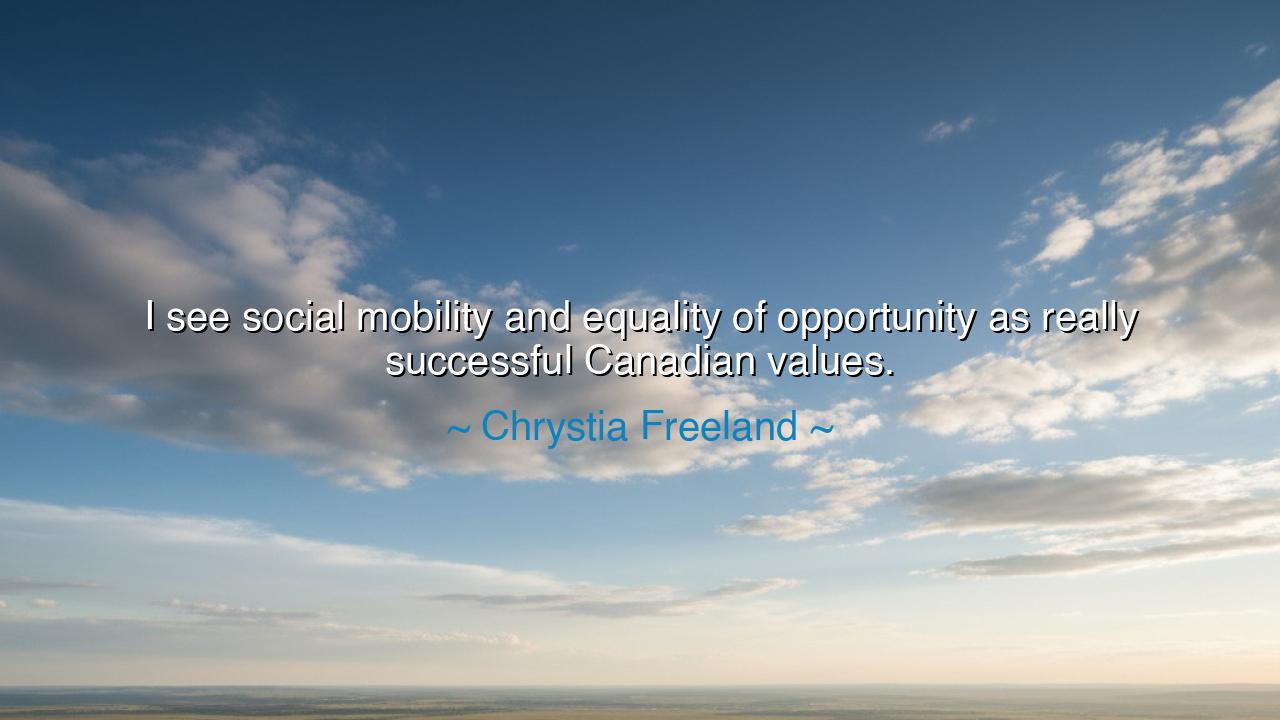
I see social mobility and equality of opportunity as really
I see social mobility and equality of opportunity as really successful Canadian values.






In the clear and noble words of Chrystia Freeland, we hear the echo of a nation’s moral compass: “I see social mobility and equality of opportunity as really successful Canadian values.” These are not the empty phrases of a politician seeking favor, but the deeply rooted convictions of a thinker who has studied the rise and fall of societies and knows what binds a people together. Her words speak not of wealth or conquest, but of something greater—the belief that every soul, no matter its birth or burden, should have the chance to climb higher, to build, to dream, and to thrive. Social mobility and equality of opportunity—these are the twin pillars of justice, the foundation upon which the house of a free people stands.
The origin of this quote lies in Freeland’s long reflection on the nature of prosperity and fairness. As both journalist and stateswoman, she has seen the gulf between privilege and poverty, the slow erosion of opportunity in places where the strong prosper and the weak are forgotten. In calling these “successful Canadian values,” she honors the spirit that shaped her nation—a spirit that sought not to elevate the few, but to empower the many. For Canada, in her vision, is not defined merely by its borders or its riches, but by its commitment to fairness, by its quiet faith that the son of a laborer may rise to lead, and the daughter of an immigrant may stand equal in dignity and voice.
At its heart, Freeland’s statement is both celebration and challenge. It celebrates what has been achieved—the schools that educate without prejudice, the institutions that strive to lift rather than divide. Yet it also challenges all who hear it to guard these values against complacency. For social mobility is not a gift that endures by accident; it must be renewed by courage, vigilance, and compassion. A nation may call itself just, but if its poor remain trapped and its gates of opportunity close, then its words are hollow. Freeland’s insight reminds us that equality of opportunity is not a promise written in law alone, but a living practice—one that must be defended by every generation.
History offers us luminous examples of this truth. Consider the story of Viola Desmond, the Black Canadian businesswoman who, in 1946, refused to give up her seat in a whites-only section of a Nova Scotia theater. Her quiet act of defiance became a spark for the civil rights movement in Canada. Desmond was not wealthy, nor powerful; yet her courage opened doors for others, proving that equality of opportunity cannot exist without the bravery of those who challenge injustice. In her story, we see Freeland’s vision embodied—the belief that a nation succeeds not when opportunity is inherited, but when it is accessible to all, regardless of race, gender, or origin.
And yet, Freeland’s wisdom carries another layer: that social mobility is not only an economic principle, but a moral one. It speaks of faith in human potential, of trust that when barriers are lifted, greatness will rise from unexpected places. It demands humility from the privileged and hope from the struggling. In this, she joins the long tradition of thinkers who have equated justice with possibility—from Aristotle’s dream of the virtuous polis to John Stuart Mill’s call for equality through education. Freeland’s voice, modern yet timeless, calls her people to remember that the true wealth of a nation lies not in its treasures, but in its fairness.
But such fairness must be cultivated. It does not spring naturally from prosperity—it must be chosen, guarded, and built. A society that forgets equality of opportunity soon divides itself into classes of resentment and arrogance. Those who rise must remember those who follow; those who lead must lift, not exploit. Freeland’s message, therefore, is not only national but universal: that freedom and justice cannot exist without mobility, that progress is measured not by the height of towers, but by how many can climb them.
So let this teaching be preserved for generations to come: social mobility and equality of opportunity are not luxuries of the fortunate, but the lifeblood of democracy itself. Let each citizen labor not only for their own advancement, but for the creation of pathways where others may rise. Let teachers see in every student a seed of greatness, let leaders judge by merit not birth, and let communities build ladders rather than walls.
For in the enduring wisdom of Chrystia Freeland, we are reminded that the greatness of a nation is not in its power, but in its fairness; not in its riches, but in its reach. When the child of the humble can dream without fear, when the door of opportunity is open to all who strive, then the promise of equality becomes not just a vision—but a living truth. And in that truth, the soul of a nation shines most brightly, reflecting not its power, but its humanity.






AAdministratorAdministrator
Welcome, honored guests. Please leave a comment, we will respond soon